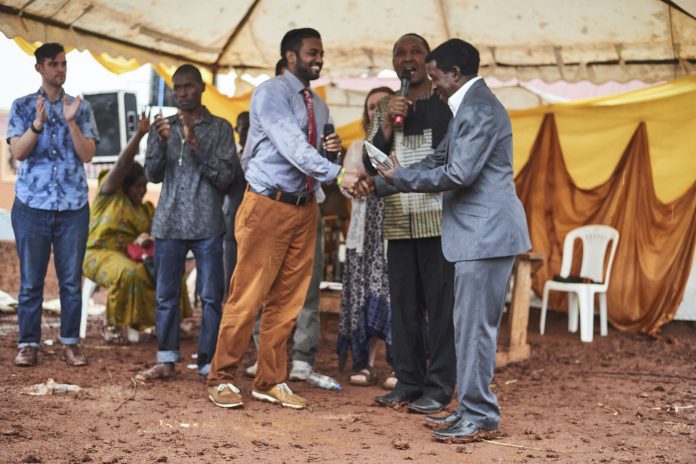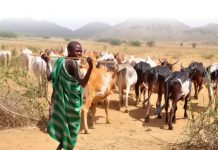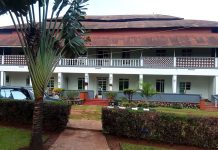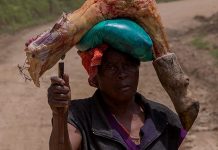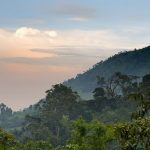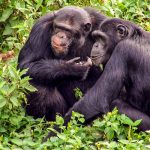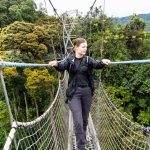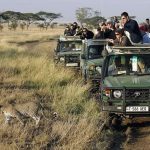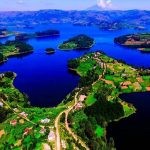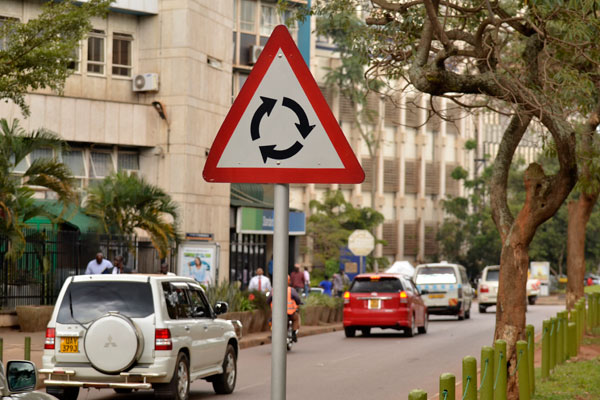All We Are has a mission to solarize over 50 schools in Uganda over the next 10 years. According to the organization, this can save money and ensure more young people spend more time in schools. We caught up with Nathan Thomas, the Founder & CEO for a chat.
Let’s start with the name- “All We Are”, Why did you choose that?
I was lucky to, at a very young age, discover that the best version of yourself is the person you truly are. For many of us this journey of fulfilment is one that spans a lifetime. All We Are is the hope that by living a fulfilled life we can take our talents, passions, and all that we are to help others realize their true potential. We believe that “it starts with us.”
What inspired you to start All We Are?
The belief that if you get to a certain point of your life and decide that now is the time to start giving back, you took too much. I was a 16 year high school student living in Findlay, Ohio USA who wanted to do something to change the world. I luckily found several people who believed in me. Eight year later, I lead a platform of over twenty young professionals in America who volunteer their time to our mission, and an incredible team of employees on the ground in Uganda who implement our work.
Let’s now talk about your work. What are your focus areas?
By the end of 2017 we equipped 20 schools in Uganda with electricity through the design and installation of solar power. We are scaling a women’s empowerment project to educate and provide female personal hygiene products that allows girls to remain in school. This year we have also launched a pilot water program to provide access to clean water to these partner schools.
As young change makers, All We Are’s focus is on responsibly building infrastructure for schools in Uganda. We focus on sustainability and putting money into the local economy with an emphasis on stewardship. Every member of our USA team is a volunteer and is personally investing in All We Are’s mission, which enables us to put 100% of public donations to use on the ground in Uganda. We believe that development is only successful when it is fueled locally by the communities. We work with the Rotary Club of Nateete-Kampala to conduct needs assessments for our projects. They are the face of our projects on the ground.
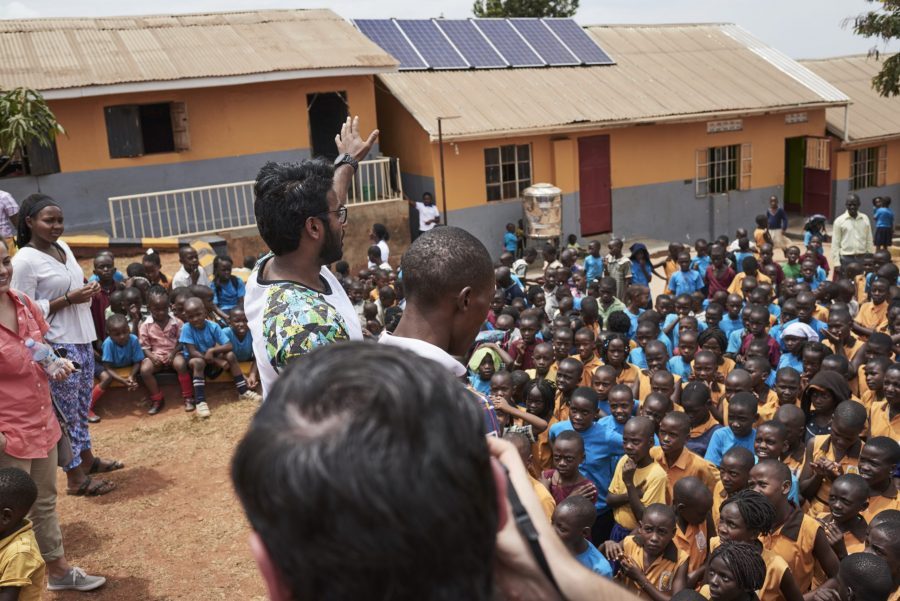
Nathan Thomas the Founder of All We Are during one of the outreaches in schools
And the communities, where do you work in Uganda?
We have worked in KLA and the surrounding area in the past eight years. This year we are pushing into more rural areas where there is no access to Umeme and the existing schools’ infrastructure is much weaker. We will be working in Rakai, Luuka, and Kakumiro to name a few Districts, and hope for further expansion in the near future.
At the end of the day, what are you trying to achieve?
A world in which we all have the right to dream. A world where every child receives an education because it is the young people who are the future of our countries.
What has been All We Are’s impact in Uganda so far?
We have spent the last eight years in Uganda helping build educational program in and around the Kampala area with the hope that we are having a positive impact on the schools we partner with. We have also been able to positively impact the lives of many members of the All We Are family on the ground in Kampala through job creation and by providing them with a means to support their families.
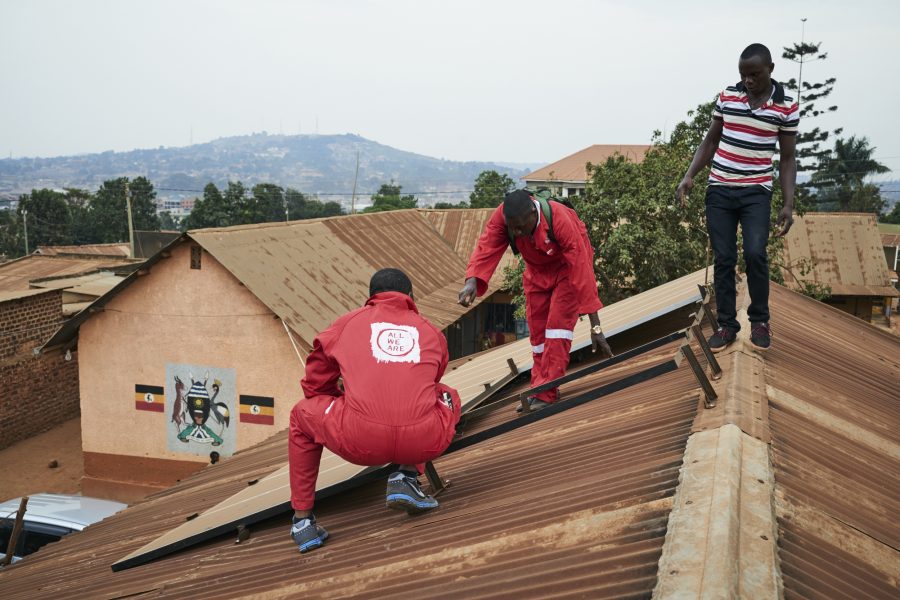
Installation of solar panels at one of the schools
Any particular impact story you can single out?
One of my favorite stories is a spotlight we did on Nambuli Rogers, Headmaster of Mackay Memorial Primary School in Kampala. We electrified this school in 2016 and also partner with them on our women’s empowerment project. The school’s motto is, “Temudda Nnyuma” and we believe that perfectly describes the work we trying to accomplish.
With development work comes a lot of uncertainty and questioning whether the solutions we are providing are impactful. In February 2017 we were in Kampala and visited Mackay Memorial. I will never forget getting out of the bus and walking up to the HM’s office to be greeted by a big hug from HM Rogers. It is in moments like this that we remember why we do what we do. Here is a link to the story: allweare.org/2017/06/spotlight-on-nambuli-rogers
Where do you see All We Are 5-7 years from now?
In 2015 we set an ambitious goal of electrifying 50 schools in Uganda by 2025. At the end of 2017, just two years later, we will already have 20 schools in the All We Are family. In five to seven years it is very possible that we will have realized our planned goal of 50 partner schools. As we scale our work, we will expand our women’s empowerment program and clean water initiative. We are committed to a problem not a solution. The problems we address surround education. As we progress as an organization, and as new technologies and opportunities become a reality, we will continue to innovate and refuse to stop challenging ourselves.
Let’s talk about personal inspiration. Which people inspire you in everything you do?
It is easy to draw inspiration from people who live fearlessly. I draw inspiration from those who fear less. From my parents who moved from the comfort of friends, family, and what was normal in India to America before my brother, sister, and I were born. To members of the All We Are team who are so passionate, and so willing, to go far beyond what society deems “millennial engagement” to be.
If someone wants to get involved in All We Are, how do they get in touch with you?
We are always looking to engage with like-minded individuals who want to be a part of the global conversation on change. Take a look at our website at www.allweare.org and our social media platforms. If what we are doing interests you, send me an email at nathan@allweare.org. Remember that the best way to start is by simply getting started.
Any last words or piece of advice to someone doing a similar initiative like you?
Share stories of success with your networks and ensure that you do so with cultural sensitivity. At All We Are we gravitate towards empowerment versus charity. You will not find images that exploit the dignity of the communities we serve, or “voluntourism” opportunities. Instead you will find a group of young people dedicated to positive change that is tangible. The key to achieving this is patience. Take the time to develop a solid foundation for your work.

